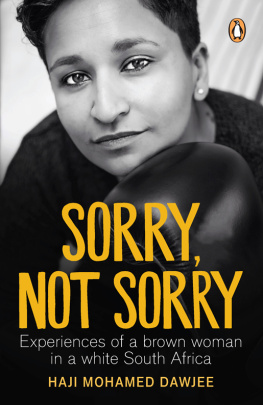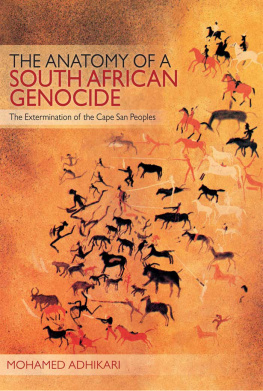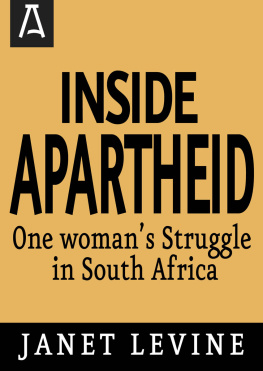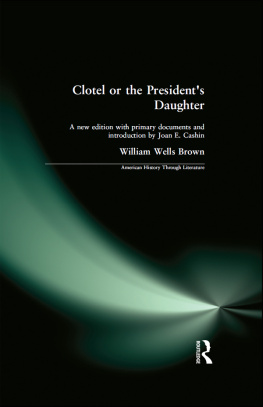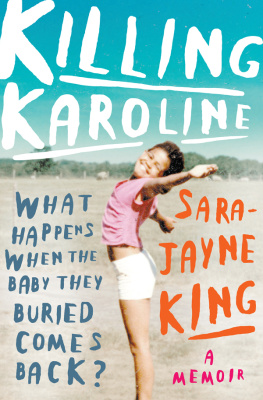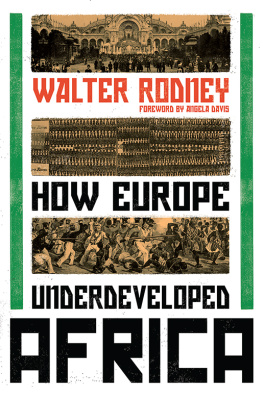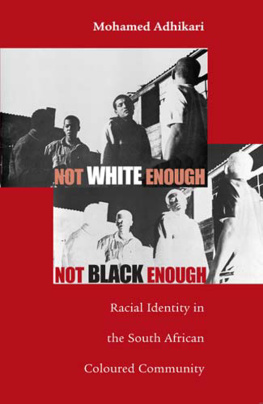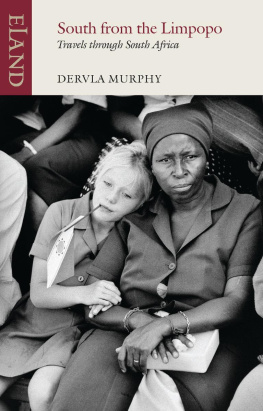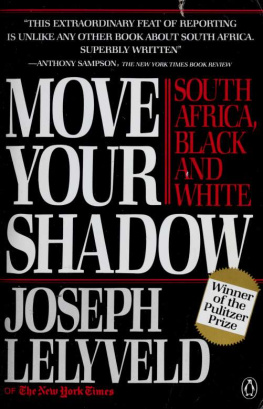Haji Mohamed Dawjee - Sorry, Not Sorry; Experiences Of A Brown Woman In A White South Africa
Here you can read online Haji Mohamed Dawjee - Sorry, Not Sorry; Experiences Of A Brown Woman In A White South Africa full text of the book (entire story) in english for free. Download pdf and epub, get meaning, cover and reviews about this ebook. year: 2018, genre: Art. Description of the work, (preface) as well as reviews are available. Best literature library LitArk.com created for fans of good reading and offers a wide selection of genres:
Romance novel
Science fiction
Adventure
Detective
Science
History
Home and family
Prose
Art
Politics
Computer
Non-fiction
Religion
Business
Children
Humor
Choose a favorite category and find really read worthwhile books. Enjoy immersion in the world of imagination, feel the emotions of the characters or learn something new for yourself, make an fascinating discovery.
- Book:Sorry, Not Sorry; Experiences Of A Brown Woman In A White South Africa
- Author:
- Genre:
- Year:2018
- Rating:3 / 5
- Favourites:Add to favourites
- Your mark:
- 60
- 1
- 2
- 3
- 4
- 5
Sorry, Not Sorry; Experiences Of A Brown Woman In A White South Africa: summary, description and annotation
We offer to read an annotation, description, summary or preface (depends on what the author of the book "Sorry, Not Sorry; Experiences Of A Brown Woman In A White South Africa" wrote himself). If you haven't found the necessary information about the book — write in the comments, we will try to find it.
Sorry, Not Sorry; Experiences Of A Brown Woman In A White South Africa — read online for free the complete book (whole text) full work
Below is the text of the book, divided by pages. System saving the place of the last page read, allows you to conveniently read the book "Sorry, Not Sorry; Experiences Of A Brown Woman In A White South Africa" online for free, without having to search again every time where you left off. Put a bookmark, and you can go to the page where you finished reading at any time.
Font size:
Interval:
Bookmark:

SORRY, NOT SORRY
SORRY, NOT SORRY
Experiences of a brown woman in a white South Africa
HAJI MOHAMED DAWJEE

PENGUIN BOOKS
Published by Penguin Books an imprint of Penguin Random House South Africa (Pty) Ltd
Reg. No. 1953/000441/07
The Estuaries No. 4, Oxbow Crescent, Century Avenue, Century City, 7441 PO Box 1144, Cape Town, 8000, South Africa www.penguinrandomhouse.co.za

First published 2018
1 3 5 7 9 10 8 6 4 2
Publication Penguin Random House 2018
Text Haji Mohamed Dawjee 2018
Cover photograph Neo Baepi
All rights reserved. No part of this publication may be reproduced, stored in a retrieval system or transmitted, in any form or by any means, electronic, mechanical, photocopying, recording or otherwise, without the prior written permission of the copyright owners.
PUBLISHER: Marlene Fryer
MANAGING EDITOR: Robert Plummer
EDITOR: Lauren Smith
PROOFREADER: Bronwen Maynier
COVER AND TEXT DESIGNER: Ryan Africa
TYPESETTER: Ryan Africa
Set in 11.5 pt on 16 pt Adobe Caslon
Penguin Random House is committed to a sustainable future for our business, our readers and our planet.
ISBN 978-1-77609-266-6 (print)
ISBN 978-1-77609-267-3 (ePub)
For my grandfather, who said:
People will steal the milk from your tea
But they cannot steal the knowledge from your mind
Contents
The other day, a young man proclaiming to be a woke white asked me very nicely to be on his podcast, which sounded like an effort to teach other whites to be woke.
I was uncharacteristically sharp in my decline. Sorry, sir, but I think woke politics are fast asleep. Well, they certainly bore me to death. Needless to say, the young man did not respond. Im sorry for being the sharp matriarch I am determined not to be, but I was true to my view. In my experience, it can be a movement that excludes and punishes, speaking a language that bamboozles.
In its writing, it can often speak at and not to.
Im in a phase of my writing that seeks to include, to tell stories and to find solutions, so I often find woke writing dense with didacticism but low on style. Sorry, Not Sorry upends my notions and has me alive, again, to the potential it has woken me up and made me take a second look at the cultural and racial questioning essential to our time.
New political trends interest me and the self-proclaimed woke generation are vital and interesting. Using social media as a mass urban medium, they are changing norms faster than my generation did with their digital smarts.
Take the film, Inxeba (The Wound). A love story that takes place in a Xhosa initiation school, it has set South Africa alight as traditionalists claw against the film. Some scaredy-cat movie houses cancelled screenings when a particularly forbidding woman from the hitherto unknown Icamagu Institute staged a sit-in at the Commission for the Promotion and Protection of the Rights of the Cultural, Religious and Linguistic Communities (the Orwellian flower in our bouquet of Chapter 9 institutions which protect and advance constitutional rights).
Ive seen this show-reel before. Every time the SABC tried to screen a documentary on why so many young initiates were dying in the two initiation seasons, it would be hauled off the air as tradition clashed with transparency.
And I know, rather intimately, how freedom of artistic impression has been trumped by the rights to culture and religion: Im the editor who published images of the prophet Muhammad and of The Spear painting by Brett Murray, and got damned for them.
We are a country that primes peace and stability over free expression (in an often false binary, I might add) and one that, until now, assumed the unassailable right to cultural and traditional protection, certainly over artistic production.
That changed with Inxeba, as the woke generation adopted the film and turned its screening into a cultural movement against being told what it could or could not watch.
So, I am in a season of new love with woke people. And Haji Mohamed Dawjee has enhanced my affection with this collection of touching, loving, incendiary, searing and intimate essays. Shes both woke and funny, and she can write.
* * *
One of the reasons I divorced woke politics (and it divorced me too, I have to be frank) is that it can often be tedious and insider. Also, Im a non-racialist rainbow nation adherent, which is a bit of a profanity in that world. The language of woke can handicap. Take this. I work at HuffPost SA, the South African sister to the Huffington Post family. We write headlines snappily and quickly I labelled something a politician did as dumb and left.
The news editor called. Some people are complaining. Your language is ableist.
What?
She explained that it could be read as a slur on people who couldnt speak. I was, well, dumbfounded. I still am when I get hit by phrases like cis-het normativity. Come on, own up: you dont know what that means either.
There is none of that in Hajis screamingly funny, achingly painful, excoriatingly honest Sorry, Not Sorry. Its norm-challenging without the lazy descent into the rhetoric of slogan. It shows and doesnt tell, except at the very end, where the author explains the title.
I dont know where to begin to introduce you to the little pearls dotted in this first (but not last) book by Haji. So lets start at the top: an essay called We dont really write what we like a response, of course, to Steve Bikos I Write What I Like.
She starts: No one owns their stories and the telling of them like white male writers. They are given endless opportunities for it. They can write about anything. They can pen rants about white-men problems and white-men wealth. They can wax lyrical about cars and boats and spaceships the cherry on the vanilla cake is that they also get to write the soft, sensitive, soulful stuff.
Such freedom, she notes, is not available to writers of colour: When was the last time you saw a piece of writing in mass-produced, commercial media by a person of colour who stitched together lengthy, breathtaking sentences about, lets say, a nostalgic song they happened to hear on the bus, or the train, or the aeroplane while on their way to deliver a handwritten note to an ex-lover they were trying to win back?
And so, Haji writes.
She writes about tekkies, her grandpa, her mom and dad, a night at a pub. She writes about Serena Williams and her own aborted tennis career and she writes about her love for her wife.
Read it all, but if you dip in and out, make sure that you read A brain tumour can change your mind, the essay featuring the speech Hajis dad made at her wedding to the equally gifted journalist and writer Rebecca Davis. You will smile and dab away a tear for days. And while youre there, read about her anti-establishment grandpa too. She makes his character come alive as he drives her to school in his olive-green Merc, and cooks exploding soup at their home in Laudium, Pretoria.
She writes what she likes. She writes about Bollywood movies, about tweeting Nelson Mandelas death, and she writes a journal about depression that is quite the best piece of mental-health writing Ive read. In The curious case of the old white architect, she writes what a media establishment that Haji says is still white-dominated would not let her write, because it has pigeonholes for what black women must write.
Font size:
Interval:
Bookmark:
Similar books «Sorry, Not Sorry; Experiences Of A Brown Woman In A White South Africa»
Look at similar books to Sorry, Not Sorry; Experiences Of A Brown Woman In A White South Africa. We have selected literature similar in name and meaning in the hope of providing readers with more options to find new, interesting, not yet read works.
Discussion, reviews of the book Sorry, Not Sorry; Experiences Of A Brown Woman In A White South Africa and just readers' own opinions. Leave your comments, write what you think about the work, its meaning or the main characters. Specify what exactly you liked and what you didn't like, and why you think so.

